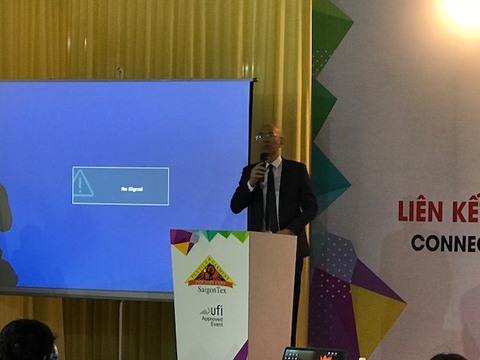
Tran Thanh Hai, deputy director of the Import-Export Department under the Ministry of Industry and Trade at a conference on textile value chains in HCM City on Thursday. — VNA/VNS Photo Viet Duing
To sustain their growth, Vietnamese textile and garment firms should pay more attention to technologies and their value chains, a conference on textile value chains heard Thursday.
Economist Tran Du Lich said Viet Nam is one of the top five garment and textile exporters, and is likely to increase its exports by US$4 billion this year to $35 billion.
Le Quoc An, former president of the Viet Nam Textile and Apparel Association, said Viet Nam has a young workforce with 65 per cent of the population being younger than 50, and so workers find it easier to adapt to new technologies.
Viet Nam also has free trade agreements (FTAs) with many countries, and is currently negotiating with more, which increases the competitiveness of its products overseas, he said.
However, its productivity is relatively low compared to countries such as Malaysia and China since it still mostly relies on the inefficient cut-make-trim model, and textile firms rely on their customers to provide the fabric, designs and specifications and they provide only the labour and bring little added value, he said.
They should adopt advanced technologies and techniques to move away from simple manual work and add more values such as integrating technology 4.0 in their research, production and marketing, he said.
“Improving our value chain is one of the best ways to keep our textile and garment industry growing, especially as machines are very likely to replace human labour in the next 10 years.”
Businesses should also allocate resources to training workers to adopt these technologies, he said.
Besides, firms with similar profiles should collaborate so that they could jointly negotiate for bigger orders, and firms in each value chain should link up so that production, marketing and logistics can be co-ordinated more easily, he said.
When choosing partners, businesses have to pay attention to each other’s qualities and strategic goals, and need to trust each other, he said.
Pham Xuan Hong, chairman of the HCM City Association of Garment, Textile, Embroidery and Knitting, said the Government should support the development of the industry by continuing to sign FTAs and easing procedures to enable foreign firms to invest in Viet Nam and bring newer technologies. — VNS